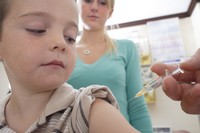Swine Flu Vaccinations Start
After months of preparations, H1N1 flu vaccinations begin this week.

This week's initial shipments to states are so small that, with a few exceptions for children, most states are reserving them for health workers so they'll stay healthy enough to care for the flu-stricken and vaccinate others.
Inoculations won't gear up in earnest until mid-October, when at least 40 million doses against what scientists call the 2009 H1N1 flu will have rolled out, with more arriving each week after that.
This is uncharted territory — you really can't plan too far ahead to say, "I'll schedule my shot on Oct. 16 at Clinic X." Only as shipments start arriving will local doctors, clinics, school vaccination programs and drugstores get word that their doses are coming and how much. Each state health department decides that, The Associated Press reports.
It was also reported, according to a statement released Friday from the Los Angeles County Department of Public Health, local clinics and doctor's offices will receive small shipments of the FluMist nasal spray vaccine as soon as Wednesday.
"While the FluMist nasal spray vaccine may not be appropriate for everyone, we do encourage those who can receive this form of the vaccine to get it," said Jonathan E. Fielding, the county's director of public health.
"We especially encourage eligible school-aged children to receive the FluMist H1N1 vaccine. We had expected to see an increase in flu cases once the school year started, and those predictions have come true. Most cases of the pandemic H1N1 flu continue to present mild to moderate symptoms, but some individuals have had serious complications."
Larger shipments of the vaccine -- in both the nasal spray and the traditional injectable form -- are expected to arrive this month, according to the department's statement, The Los Angeles Times reports.
Meanwhile, pandemic H1N1 has been circulating since it was first identified in two U.S. children last March but it has picked up speed since schools returned from their summer break in August.
The CDC said it is not especially deadly, but it is affecting younger people than seasonal flu usually does and at a time of year when there is generally little or no influenza.
Dozens of children and at least 28 pregnant women in the United States have died from the virus and at least 100 pregnant women were sick enough with it to be hospitalized, the CDC said.
Pregnant women, healthcare workers and people with special health conditions including heart disease and diabetes are supposed to be the first to get the vaccine, Reuters reports.
Subscribe to Pravda.Ru Telegram channel, Facebook, RSS!


